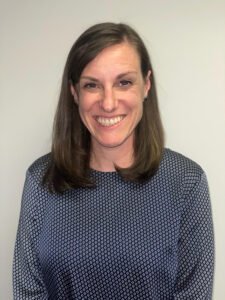She is expected to become Aurora of CNY’s executive director next year. The organization serves the blind and visually impaired, deaf and partially deaf populations. She talks about her plans for the nonprofit
By Mary Beth Roach
 Kate Weidman is currently the deputy executive director at Aurora of CNY, which provides services to the blind and visually impaired, deaf and partially deaf populations in Central New York. She will take over the executive director in February 2025, when Debra Chaiken resigns.
Kate Weidman is currently the deputy executive director at Aurora of CNY, which provides services to the blind and visually impaired, deaf and partially deaf populations in Central New York. She will take over the executive director in February 2025, when Debra Chaiken resigns.
Q: You’re going to be taking over in February. What do you believe you will bring to this new position?
A: I originally was on the board of Aurora, and I learned that this organization is so great. Knowing the depth of the services, knowing how many services we provide, knowing all the lives that we touch — what I bring is the passion for the people we serve and my drive to better our community. I really want to make sure that at the end of the day, I am creating a more inclusive community.
Q: What do you envision for the future for the organization? What do you want to achieve or accomplish as executive director?
A: Aurora has been around for over 100 years, and I would want Aurora to stay around for another 100 years. I want Aurora to still be a positive force in the community to serve our folks that are blind, visually impaired, deaf and hard of hearing. That’s really my main mission.
For me to say that I envision this going somewhere, it wouldn’t do the community justice, because it really should be those folks driving what services we provide as an organization.
Q: I’ve noticed on Aurora’s website that the organization collaborates with a good number of other community-based groups to offer services. Do you anticipate more collaborations?
A:. I do anticipate a lot of partnerships in the future. We all have our different specialties, and we can never do it alone. So, we are going to be partnering with a lot of organizations to ensure that we’re meeting the needs of the community. People are multifaceted. They don’t just need one service. They need services, whether it’s primary care, mental health, services to help them stay in the home. We are going to be collaborating to ensure that the entire person is taken care of.
Q: In the months while you’re still the deputy executive director, how are you preparing for this next chapter?
A: I am learning everything I can — the different organizations in the community, the different resources — and getting to know staff, getting input from, not only our staff, but our consumers, our stakeholders and the community. Everyone has such wonderful viewpoints and ideas, and it would be a disservice not to take those into consideration and learn from them. I’m afforded the opportunity to learn. Deb isn’t retiring until February, so I can learn from her.
Q: How many people does the organization serve?
A: We provide about 1,200 services per year, and many times folks receive multiple services from Aurora. That is just the tip of the iceberg because we do a lot of community engagement, as well, including outreach.
For the blind and visually impaired, we provide orientation and mobility services, which help individuals develop or relearn skills and concepts that help them remain safely in the home. We do vision rehab therapy. We have support groups for our blind consumers. We do children’s socialization programs. We provide social work for individuals who are blind and visually impaired. We have pre vocational skills training for youth, ages 14 to 21. We also have work readiness. For the blind and visually impaired, we have a program through the VA, where we operate their switchboard.
We also have services for the deaf and hard of hearing. We have deaf employment services, so we have support, employment and placement. We have our wonderful Children’s Hearing Aid Program, which we call CHAP. We have our social work services as well. We also do community education. We have pre vocational training as well for youth ages 14 to 21, and we do provide interpreter services. We contract with interpreters in the community. I feel we are a small but mighty nonprofit organization in the community.
Q: What is your service area geographically?
A: We cover Cayuga, Onondaga and Oswego counties.

